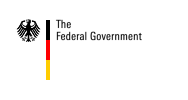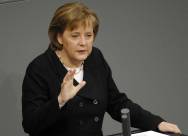Speaking in parliament, Merkel stressed that the people need Europe, but that they also need to be able to see the advantages it brings. She told German MPs: "We need to conceive of this Europe from the perspective of the people."
It is only if Europe is economically successful that it will be able to assert its values and remain what it is: "an area of peace, freedom, security, and prosperity".
Integrated energy and climate-protection policy
Merkel reminded her audience that reliable energy supplies are absolutely necessary for a secure economic future of the European continent. She added that this is inseparably connected with effective climate-protection measures, given the alarming signs of climate change currently being seen.
Merkel stressed that developed nations cannot continue to produce greenhouse gas emissions on the same scale as they have in the past. If they fail to counteract this trend then the effects of climate change will exact a much higher price than what it would cost to take preventive measures.
Merkel announced an integrated energy and climate-protection concept for the forthcoming EU summit, referring to it as a basis for a competitive and climate-friendly energy strategy in Europe. She said the private sector, ranging from the car industry to private homeowners, needs to help by reducing CO2 emissions. At the same time there is a need to expand the use of renewable energies, an area in which the EU is already a world leader.
"We will prove that economy and ecology are not irreconcilable," Merkel noted with determination.
New impetus for growth inside and outside the EU
In Merkel's view, the EU must continue to pursue its objective of becoming the world's most dynamic growth market by 2010 (Lisbon Strategy), despite the fact that it may take longer to get there than originally planned.
Last year economic growth in Europe rose from 1.7 to 2.8 percent. Unemployment declined from 8.8 to 7.3 percent, a considerable improvement, on which we need to build further, Merkel said.
>> Lisbon Strategy
She stressed the need for a "regulatory framework that will encourage free development" to help accelerate this positive trend. A significant reduction of administrative burdens in Europe is intended to contribute towards this end. Merkel announced EU plans to reduce reporting obligations for companies by 25 percent, saying that this alone would create an additional growth potential of 1.5 percent.
Merkel hopes to gain additional impetus for growth from liberalized world trade and closer transatlantic economic partnership. In view of the strength of emerging economic powers such as China and India there is a lot to be said for closer transatlantic cooperation in the area of trade. Initial negotiations were conducted last year on the creation of a European-American free trade zone. Thus far an agreement has been prevented by differences on intellectual property and tariffs. Merkel wants to put the subject back on the agenda at the EU-American summit in Washington at the end of April.
Strengthening the European social model
Merkel expressed her commitment to the European social model. She said economic success is not a value in and of itself and that it must serve the public good. The European welfare states have come under pressure from globalization. As a result, sustainable economic growth, based on both quality and quantity, will be indispensable for Europe.
Economic competitiveness, social solidarity, and the fight against unemployment are objectives of equal priority, Merkel said.
Making Europe more effective
The German Presidency wants to resume the currently interrupted process of adopting a European constitutional treaty with a view to ensuring the EU's ability to take effective action. The Union of the 27 cannot be governed with the Treaty of Nice, Merkel said.
"We need a treaty that places stronger emphasis on regional responsibility and makes Europe capable of effective action at the institutional level," she noted. By June the German Presidency wants to present a road map showing how the constitutional process can be taken forward.

